Daniel Sherrier's Blog, page 5
August 30, 2018
Iron Man, The Count of Monte Cristo, and Reinvention
My exploration of YouTube continues. Now let’s look at Iron Man and The Count of Monte Cristo…
August 23, 2018
The Timeless Spider-Man
Sometimes, it’s good to try something new. So I taught myself the basics of video editing and created a YouTube video. I know it’s not perfect, but the learning process is always ongoing.
For now, though, you can watch me pontificate about the enduring appeal of Spider-Man’s origin story.
August 16, 2018
The Flying Woman — Chapter Three
The Flying Woman is now in production. A cover is in the works. The interior design is in progress. And the manuscript is done. It shouldn’t be too much longer.
But in the meantime, here’s one more preview chapter…
(For a draft of Chapter One, click here, and for a draft of Chapter Two, click here.)
*****************
Copyright 2018 Daniel R. Sherrier. All Rights Reserved. Do not reproduce without permission.
The Flying Woman
–a novel–
by Daniel Sherrier
3.
As she descended in the elevator, Miranda considered what she just did. She had never felt any physical attraction toward Ken Shield. But, on an intellectual level, she acknowledged that he possessed many fine qualities. He wasn’t right for a brief, passionate fling. A guy like him qualified as long-term boyfriend material. And Bianca was wrong that Miranda avoided long-term boyfriends—never mind that the longest of her numerous relationships lasted five months, back in high school …
But yeah, Ken seemed like a decent option. What was the harm in a couple of dates?
The elevator carriage settled, and Miranda expected to find Officer Hoskins somewhere along the well-lit path, ever vigilant as he stood guard over the park. But once the door opened, she saw only a long, vacant stretch of brick surrounded by topiaries and impenetrable darkness. The park did span several acres around the tower. Perhaps something demanded Hoskins’s attention.
Miranda kept her phone in hand as she began her brisk walk, reminding herself that this was one of the safer parts of town. Still, her parents had issued many warnings about the dangers a city held after dark, and her mind replayed the greatest hits. Miranda felt her ears expanding to catch even the faintest rustling of leaves.
She heard something else. Not leaves or wind or any scurrying critter. Nothing from nature. Nothing natural.
A moan. It was coming from somewhere behind those bushes. Miranda’s senses all dialed up to maximum.
She decided to ignore it and stay on the path, stay under the lights. Keep her eyes on her phone and check the hell out of those text messages. Or pretend to while secretly poised to dial 9-1-1 if the need arose—a need like someone leaping out and strangling her.
Whatever it was, Officer Hoskins was probably already on it. That explained his absence. But what if he was the one moaning?
“I’m hurt,” the moaning person called out from the darkness, her voice hoarse.
It was definitely a woman’s voice, not the policeman’s. And he wasn’t around to respond to the cry for help.
This could have been a trap—some creepy man lurking, sheathed in the dark, ready to throw the first unsuspecting good citizen into a black van. And if not, well, really, what could Miranda do to help? Aside from the simple task of dialing 9-1-1.
It would be the right thing to do, in case someone was suffering. Miranda could make the call and run away.
“Help. Please.”
Miranda wanted to keep walking until she exited the park, but her feet refused to budge and she cringed. She remained physically capable of forward momentum, just not mentally.
Her stomach folded in on itself, threatening to incite debilitating queasiness unless she did the right thing. If she walked away, she’d spend days or weeks dwelling on whatever she walked away from, constantly checking the news for any hints about what the hell this was. All food would lose its appeal, and she would look back on the concept of sleep with nostalgic fondness.
She considered running back up to Ken, but he was nearly half a mile above the ground. And someone right here might be hurt.
Miranda dialed the digits 9-1-1 and positioned her thumb over the “call” icon. Without hitting it just yet, she advanced toward the source of the moaning and commanded herself not to dissolve into a shivering mess of nerves. She did not heed herself. Her shaking thumb almost jabbed “call” by accident.
Didn’t happen, though. A flash of light cut through the park for just a second, and she stopped. Where did it come from? Not the park’s lighting system. Was it … Fantastic Man? Was she about to meet Fantastic Man? This seemed more like something he should handle, not her.
“That was me,” the woman said, each word scraping against Miranda’s ears. So scratchy and parched. She wasn’t far, maybe only a few feet into the darkness. “Want to make sure I … have your attention.”
Without stepping off the path, Miranda dared to look between the bushes. A new source of light flickered low to the ground, revealing a much older woman lying on the grass. The light came from the strange electricity that was cascading over her unusual outfit, which looked like a superhero costume—emerald tights with a scarlet cape. A deep red symbol occupied the center of the chest, the silhouette of a bird’s wing melding into a fierce, sharp beak. The costume lacked a mask, though. But this woman had to be at least fifty, maybe sixty, and Miranda had never seen her before. Surely if an older female superhero had emerged, she would have dominated the news as much as Fantastic Man did, probably more so on account of her unexpected demographic affiliation.
Or was she a supervillain? Was this a trap? Was Miranda stupidly falling into a trap?
The woman was clutching her side, pressing her hand against a dark liquid …
Blood. The super electric woman was wounded to the point where she was bleeding all over the grass. Miranda did not care to stick around to learn who did the wounding, nor did she relish the idea of running away and unwittingly intercepting such a person.
The woman reached toward Miranda with her free hand, which glowed as bright as a standard light bulb, no more intense than that. The electricity never sparked beyond her elbow, so the hand appeared safe.
“Come here,” the woman said. “Help me up. The pain … is too great.”
If she was actually in pain. Miranda started to wonder. The injury seemed real, but the woman almost looked like she was smirking. Miranda’s eyes were still adjusting to the aura of electrical light, though, and she wanted any excuse to get the hell away with a clear conscience.
Paranoia was not an excuse to let someone suffer, so Miranda started to reach for that bright, quivering hand. And paranoia froze her anyway, after only an inch of movement.
“Should I call an ambulance or the police?” Miranda asked, continuing rapidly without pause, “And who are you and where is that electricity coming from? Am I in danger just by standing here? Are you going to kill me? Please don’t kill me.”
The woman chuckled through gritted teeth, as if Miranda had told a joke. “Just grab my hand, dear.”
So many dangers a city held at night … “Where—” Miranda cleared her throat to stop from squeaking. “Where did you come from?”
“Very far. It’s quite a story.” The woman coughed, and her scratchiness worsened. “Come here and I’ll tell you all about—”
Another loud moan. She writhed, and the electricity sparked brighter, flashing like lightning. In that split-second of illumination, something glinted across the field, and the glint looked person-shaped. Miranda tensed, and hoped her imagination was embellishing a garbage can, which was indeed a possibility. But still …
Time for 9-1-1. Miranda tapped her phone, but the screen had shut off from disuse. She was about to wake it up, but the woman managed to speak again.
“Not much time. Come here.”
She sounded so forceful, almost rude, but why wouldn’t she be? She was clearly in agony, probably dying, and the only person close enough to help her was struggling to lift a finger. Another lightning flash would have been helpful—Miranda could have confirmed if the glinting had reflected off some mundane, harmless object.
But if there was a dangerous individual nearby, what safer place to be than beside a super-person, even a wounded one?
“Okay,” Miranda said, stepping further onto the grass. “Let’s, um, get you out of here.”
Miranda reached forward. The strange glow warmed her, and it brightened and grew hot as the woman reached up. Miranda wasn’t sure if this was the best course of action, but she’d still be able to live with herself afterward. If she was still living, that is.
The electrical woman’s fingertips brushed against Miranda’s, casting an unexpected chill.
And the woman quickly withdrew. She gazed at her own shivering hand, horrified by it.
“You were willing to help me,” she said. “And I almost—but why do I feel this way? I’ve never—”
The woman descended into nonsense, most of it inaudible, something about a strange sensation in her head, an unnatural migraine she was struggling to identify. Her rambling further devolved into incoherent utterances about good and evil, during which Miranda was utterly baffled about what the hell she should do.
Before Miranda could make any decision, the woman landed on a clear question: “What have I done with my life?”
The woman hacked out the nastiest cough yet, and her whole body convulsed. She required serious medical attention that Miranda had no idea how to render. Where the hell was Officer Hoskins? She tapped her phone’s screen, but it wouldn’t turn on. The battery died. It had been halfway charged minutes earlier, but now the phone was useless.
And the woman was still convulsing, ever more violently, her electric energy intensifying …
A brighter glare washed over Miranda, and she raised her hands to shield her eyes from the light. Her arms itched, and the sensation swept across her skin, passing an instant later, only to be replaced by nausea. She could feel nothing beneath her feet, as if she somehow lost track of the ground. But that, too, passed, and the light dimmed.
She lowered her arms, and the woman was gone. In her place, charred grass formed a silhouette, like a crime scene outline.
Did Miranda just watch a woman die?
She did. The woman died, some kind of supernatural death that didn’t even leave a body behind, and if Miranda reported it … who would believe her? Maybe more people these days, but still … what concrete information could she even supply?
Queasiness overcame her after all, forcing Miranda to her knees as she dry-heaved. Lightheadedness arrived next, followed by crawling skin and a vague sense of movement as the night faded away.
July 19, 2018
The Flying Woman — Chapter Two
The Flying Woman is coming later this year, but for now, here’s the latest draft of Chapter Two. (Read a draft of Chapter One here, when the book was called Terrific.)
*****************
Copyright 2018 Daniel R. Sherrier. All Rights Reserved. Do not reproduce without permission.
The Flying Woman
–a novel–
By Daniel Sherrier
2.
Greek gods lined the way to Mount Olympus … though these gods appeared in the form of meticulously maintained topiaries, and this Mount Olympus was a fat tower occupying a public park in the center of the city, standing taller than all else within a seven-mile radius.
Miranda hiked between looming bushes, down the long brick path that led straight to the elevator centered beneath the tower. As always, she found the nice old policeman, Officer Hoskins, patrolling the park with a friendly smile beneath his white mustache.
The overhead lights shaded and deepened his wrinkles as he nodded at her. “Welcome back, young lady. Enjoy yourself up there—but not too much, you hear?”
He said that every single time, and he chuckled at himself every time. But Miranda had to admire the old man’s relentlessly positive attitude. He may not have gone far in his career, but he seemed happy where he was. An enviable quality.
“Yes, sir. I’ll be sure to keep my ruckus to a minimum,” Miranda said, mirroring the smile.
And she entered the elevator, as usual, alone.
Her family had retired to their hotel, but she continued to brim with restless energy from another successful performance. Going to bed would have resulted in a long night of staring at the ceiling. Better to gaze at the stars from the city’s best vantage point, which was seldom busy this late, making it the perfect spot for quiet reflection and unwinding.
Sleeping would have been sensible. Monday was a day off from the play, but not from her side gig—acting in the background of a movie. She was going to be an extra. Extraneous. Expendable. But even that meager paycheck wasn’t expendable, not to her. In any case, Miranda had plenty of experience in the background and therefore could background-act on a minimum of sleep.
The elevator car lifted off, embarking on its two-thousand-foot climb.
Her ears popped, and white noise was Miranda’s only soundtrack as the car slid up the rails. Only external soundtrack, rather.
Involuntarily, she dwelled on Bianca’s analysis of her love life. Miranda attempted to disprove the conclusion that she was somehow a saboteur of her own relationships, deliberately choosing the wrong guys. In the case of Brad, he had wanted to move in together. She didn’t. So they were clearly incompatible at this stage in their lives. Miranda didn’t consciously mean to attract a guy who would prematurely want to live together. The very notion was preposterous. But could she have, unconsciously?
The elevator settled and doors opened, granting passage to a steady, cool wind. The observation deck was, as expected, empty. Several times the square footage of her apartment, a sizable perimeter of railing—all hers for now. But she picked the same spot as always, which offered her a view over numerous skyscrapers, down the bridge connecting this island city to the rest of California, and to the distant Santa Monica skyline. Miranda intended much of her career to take place not far beyond. That was the direction of her future—she hoped.
She leaned on the bar, gazing down at the city through the protective grate. At this distance, the cars looked like fireflies that forgot how to fly, forcing them to conform to the city’s preplanned grid.
Plenty of lights still on across Olympus, even at this hour. She noticed one unusually bright spot in the far north corner, in the otherwise dim suburbs. The glare spilled up from a street but stayed confined to a tight radius, its intensity never fluctuating. Miranda suspected it was the handiwork of a film crew. Probably the movie she’d be working on tomorrow. She wanted to be working there now. She had auditioned for one of the bit roles. Didn’t get it. So many others didn’t either.
She knew her dream was not unique. Every day, she encountered other young women pursuing the same career. Only a small percentage could achieve somewhat steady work, and only an infinitesimal percentage of that group could catapult to Miranda’s ultimate goal—the A-list, the most talented, most bankable, most adored. Miranda was one of a gazillion … yet another over-ambitious and under-employed actress. But then she remembered the applause she received that afternoon, its delicious enthusiasm enveloping her …
Miranda redirected her eyes to the starlight, and she thought of Peyton’s excitement at seeing Fantastic Man. The kid could focus on nothing else the rest of the evening. At the first opportunity, Peyton took to her phone and scoured the internet for any and all tidbits. While lacking in depth, the tidbits were plentiful. Fantastic Man, though less than forthcoming on personal details, was not camera-shy. News and amateur websites alike provided ample coverage of the man who should have been impossible. Peyton had found an escape from her worries. But Miranda couldn’t escape the dread of her inevitable failure to become a star, no matter what altitude she reached. Reality refused to untether her.
She had set the bar so high for herself that she’d never be able to reach it, but she refused to lower it an inch. She tightened her grip on the railing. Her chest constricted, she couldn’t breathe, goosebumps sprouted across her shivering arms as the wind picked up …
“Miranda? Are you okay?”
The voice was familiar. A distinctive baritone. Once she ensured her eyes were dry, she summoned a huge smile and spun around—and she saw Ken Shield, an old friend from high school.
“I’m wonderful. Hey!” She rushed over to give him a quick hug. “Oh my God, how long has it been? A year? Two?”
“Three.”
“Three! Well, that’s just wrong.”
Sure, they went to rival colleges on opposite sides of this island city, but they shared that hometown bond. Not that Miranda considered herself bonded with most of the people she went to school with back in Meadowville. She couldn’t care less if she never saw ninety-five percent of them again. But Ken qualified for the other five percent that was worth seeing once a year or so—certainly sooner than three whole years.
Miranda swept her wind-blown hair from her face. “I see we’re both terrible at sleeping.”
Giving a small shoulder shrug and a soft, lopsided smile, Ken said, “Hasn’t been my strong suit lately.”
“But in our defense, we’re insomniacs with exquisite taste in late-night hangout spots.”
“We’re not without our talents.” Ken’s humble face exuded warmth and sincerity. “So how’s life as an actress?”
Miranda could’ve discussed her show, but she didn’t trust herself to stop there, not when Ken had always been such a patient listener. She worried she’d sound ungrateful or like she was too good for regional theatre. She was acting professionally and yet wasn’t satisfied—the nerve of her.
So she swatted the question away. “Oh, I don’t want to bore you with all that.”
“You wouldn’t—”
“It’s really not all that glamorous.”
“Never thought it would be.”
She lightly touched his thin arm—a small gesture to tug him away from his line of questioning and toward her own. “So you’re teaching now, right? How is that? Everything you always dreamed? Or I guess the school year hasn’t started. But you student-teached. Taught.” She winced. “Student-taught. It’s very late.”
Ken wandered to the railing. He leaned on the sturdy bar, his posture slacking. Miranda followed, and standing beside him, she tracked his gaze to the city streets beyond the tower’s dark moat of grass and sparse trees.
“Actually,” he said, not blinking, not looking at her, not smiling, “I dropped out of my school’s licensure program.”
Miranda studied his profile. So sullen. But he was always so sure about this path, as sure as she was about her own. How did he descend from certainty to quitting? Miranda could never picture herself quitting.
She blurted out her question. “Wasn’t that all you ever wanted to do?”
His head drifted down until he had fixed his gaze on the railing’s rust. “I wasn’t feeling like the right fit for it, and for a job that important, you better be the right fit.” Ken brushed his thumb against a paint chip in the process of flaking off. “I have no idea what I’m doing.”
Miranda needed to offer reassuring words, but they proved as elusive as they had with Peyton. She had gotten lucky with that conversation. If Fantastic Man hadn’t shown up, what would she have said?
Ken continued, “I want to make sure I do something useful—but not something I’d screw up.”
Then she realized—she didn’t need Fantastic Man’s presence to use him.
“Here’s how I look at it,” she said, making it up as she went. “If a man can turn himself into a beam of light, then surely we can turn ourselves into successful human beings.”
The sullenness melted away as Ken absorbed her statement, and he let out a quick grunt, his standard mode of laughter. Miranda wanted to pat herself on the back for a job well done.
“That is very crazy,” he said.
“I know! Right? Tell you what—I’ll promise to do amazing things if you promise to do amazing things. No excuses when anything’s possible.” Miranda extended a hand. “Deal?”
He nodded, and they shook on it. “Deal. I’ll see on you on the big screen, and you’ll see me doing … something of value.”
“But you will figure it out,” she said.
“I will figure it out.”
His smile was fully restored—Miranda did that, and doing so bolstered her own, locking them in a smiling loop.
But Ken broke her out of it. “Hey, how’s Alyssa doing? What’s she up to?”
Miranda swiftly recovered from the unwelcome reminder, and she had no trouble supplying the basic, surface-level summary: Yes, Alyssa was still pursuing certification to become a dental hygienist. No, Miranda wasn’t sure what the appeal of such a career was, but hey, job security was a thing for some people. And yes, Alyssa still lived near the old hometown. Ken told her to pass along a “hello” from him. Miranda didn’t tell him that she expected to forget by the time Alyssa finally got around to returning a call or text.
From there, they drifted into conversation about their college days and life in Olympus. And when Miranda learned that he, too, was planning on sticking around the city for the foreseeable future, she developed an idea.
“You know, we should get together for coffee one day,” Miranda said. “Sometime sooner than three years. We’ve got a lot of time to make up for.”
Caught off guard, Ken’s eyes widened and he tensed, like he wasn’t sure what was going on exactly.
Miranda feared she had miscalculated, but Ken was a genuinely nice guy—not one of those “nice guys” who expected some magnificent reward for the extraordinary feat of not being a blatant jerk. No, he was a good-hearted, honest soul. And, present uncertainties aside, he was responsible. Miranda had no doubt he’d figure out a rewarding, worthwhile career. His looks, though not of leading-man caliber, weren’t bad by any means. He was tall and lean, had a nice solid chin devoid of any cleft, and his dark hair hadn’t thinned any.
And Miranda had asked him out. No real build-up. No historical basis from their mutually friendly past. She blindsided the poor guy. Blindsided herself. Was this what she actually wanted?
She had no answer. But the thought of him declining, with any excuse, froze her, and the encroaching ice squeezed her every internal organ.
After a couple seconds’ consideration, though, Ken relaxed and agreed, pulling off a casual air of Sure, why not? “Yeah, that’d be nice,” he said.
Miranda masked her tension, dissipating it through light laughter as they fumbled with their phones and exchanged numbers. He promised to call sometime in the next couple of days.
Like a proper gentleman, he offered to walk her to the subway, but she declined, insisting that he not cut his Mount Olympus time short on her account.
“Are you sure?” he said. “It would be no trouble.”
“I’m pretty sure I can get to the subway without a bodyguard.” Miranda tossed a parting smirk at him. “But I’ll be seeing you, Ken.”
And she intended to do so—sometime after he started missing her.
*****************
And that’s Chapter Two! Stay tuned for more updates!
July 17, 2018
Coming this fall … The Flying Woman
This book has taken me over three years to write. I’ve rewritten it from the ground up three and a half times. And, at long last, it’s entering into the production stage.
I’ve found some good people to work on the editing, cover/jacket design, and interior design, and the book should be ready to launch no later than this November.
This will be my first novel. (My previous books are series of novellas and novelettes.) In earlier posts, I’ve called it Terrific. And it was a very different book when I started with that title. But a new title has sprung from the latest version:
The Flying Woman
Here’s a draft description:
The impossible has become reality. A masked man possesses extraordinary powers, and he’s using those fantastic abilities to fight crime and pursue justice. Meanwhile, Miranda Thomas expects to fail at the only thing she ever wanted to do: become a famous star of the stage and screen.
One night, Miranda encounters a woman who’s more than human. But this powerful woman is dying, fatally wounded by an unknown assailant. Miranda’s next decision propels her life in a new direction—and nothing can prepare her for how she, and the world, will change.
More to come!
March 7, 2018
Marvel’s Top Ten Stories: 1966-1970
At long last, round two! We looked at the top ten stories from the Marvel (Comics) Universe’s first five years a few months ago, so let’s move on to the second five years.
In that previous five-year span, everything was fresh, exciting, and unlike anything previously seen in comic books. The freewheeling creativity resulted in a wide range of quality, but certainly plenty of enduring ideas and memorable stories. In this second increment, the Marvel creators have settled into a more comfortable rhythm, achieving a more consistent level of quality. It won’t be every modern reader’s cup of tea, but the era definitely has its share of classics. Here’s ten of them:
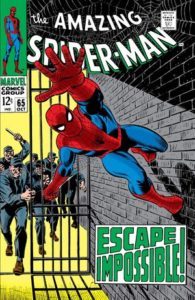 10) The Amazing Spider-Man #65 (by Stan Lee and John Romita)
10) The Amazing Spider-Man #65 (by Stan Lee and John Romita)
The police arrest an injured Spider-Man…right before the prisoners revolt. Spidey has to use his wits to navigate the situation—and save the life of his girlfriend’s father, Capt. Stacy. It’s a fun adventure that offers a different type of threat than usual, while ongoing subplots continue to simmer in the background. The issue helps strengthen the growing bond between Spider-Man and Capt. Stacy, giving Peter a much-needed friend and mentor, one who instinctively knows Spider-Man can’t be all that bad.
9) Iron Man #21 (by Archie Goodwin and George Tuska)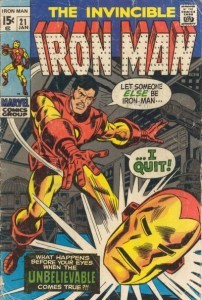
Tony Stark accepts reality—being Iron Man is likely to put a fatal strain on his heart, so it’s time to turn the mantle over to someone else. But in an ironic twist, his chosen successor, a strong-willed boxer and Iron Man fan named Eddie March, has a life-threatening blood clot. But knowing the risks, Eddie accepts Tony’s offer to take over. If he’s got only a little time left anyway, he might as well use it to do good. It’s a nice little story of one hero inspiring another.
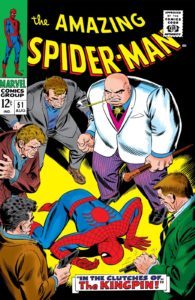 8) The Amazing Spider-Man #50-52 (by Stan Lee and John Romita)
8) The Amazing Spider-Man #50-52 (by Stan Lee and John Romita)
This three-parter begins with the iconic “Spider-Man No More” episode that, in part, inspired the plot of the movie Spider-Man 2, but its lasting contribution to the Marvel Universe is a strong debut for the Kingpin. Spider-Man’s hiatus emboldens the Kingpin to up his game, and though his best villainous days are ahead of him as Daredevil’s archenemy, he proves to be a formidable threat from the get-go, besting the newly returned Spider-Man in combat and locking Spidey and J. Jonah Jameson together in a deathtrap. And it all ends with a supporting character’s noble sacrifice. Good, solid ’60s Marvel action all around.
7) Iron Man #17-18 (by Archie Goodwin and George Tuska)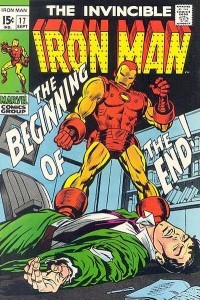
This story is quintessential Iron Man. An LMD (Life Model Decoy) of Tony Stark acquires sentience, but lacking a life of its own, it steals the identity of its creator. Stark’s own technology supplants him as the head of his company and as Iron Man, leaving him with almost nowhere to turn—except cheesy villain Midas and, more interestingly, the rogue Madame Masque. The story escalates to an Iron Man vs. Iron Man battle, with Tony—and his weak heart—giving everything’s he got while making do with a primitive version of his armor. In addition to providing the reliable sci-fi staple of out-of-control technology, the story also serves as an excellent metaphor for a man being his own worst enemy.
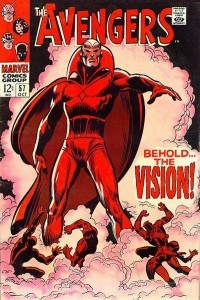 6) The Avengers #57-58 (by Roy Thomas and John Buscema)
6) The Avengers #57-58 (by Roy Thomas and John Buscema)
The Avengers manage their best issues up to this point, with the introduction of the Vision and another tussle with the recently introduced Ultron. The android (or, more accurately, “synthezoid”) Vision has to rebel against his creator in order to establish his “humanity,” and then when the Avengers consider him for membership, he learns whether an artificial man can gain acceptance among humans. John Buscema’s art is in top form in these two issues, ranging from the Vision’s eerie, humanoid-but-inhuman form on the first page to a splash panel of him shedding a tear on the last.
5) The Amazing Spider-Man #39-40 (by Stan Lee and John Romita)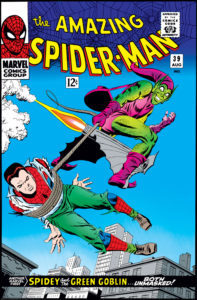
We get some excellent forward momentum in this two-parter. The Green Goblin’s identity had been a mystery since his debut a few years earlier, and here we finally learn that he’s Norman Osborn, father of Peter’s new classmate Harry Osborn. But not only does Peter learn who the Goblin is—the Goblin also becomes the first person to learn that Peter Parker is Spider-Man. The shared secret and personal connection add layers to their conflict that were unique among Spidey villains, instantly catapulting the Green Goblin to the top tier of foes. And what’s especially great is how, in the end, Spider-Man insists on showing compassion for his enemy, despite the greater threat he now poses.
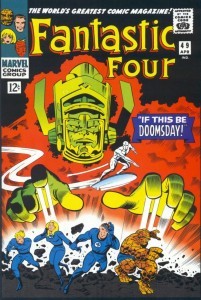 4) Fantastic Four #48-50 (by Stan Lee and Jack Kirby)
4) Fantastic Four #48-50 (by Stan Lee and Jack Kirby)
The FF are at their cosmic best in this classic three-parter, in which Lee and Kirby’s imaginations are firing on all cylinders. Galactus arrives to eat the planet, and the Fantastic Four must figure out how to defeat a being so powerful that they’re nearly insignificant by comparison. The Silver Surfer debuts with his own little arc of a servant choosing to rebel against his master, and he introduces tension in the Thing’s relationship with Alicia Masters. The fate of the world is at stake like never before, but Lee and Kirby never neglect their characters.
3) Spectacular Spider-Man Magazine #2 (by Stan Lee and John Romita)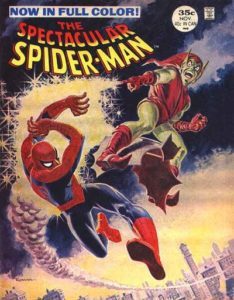
It’s hard not to recognize elements of the first Spider-Man movie in this extra-sized issue. The Green Goblin regains his memory, putting Spider-Man’s life—and secret identity—in jeopardy. A highlight is a tense dinner scene in which Norman Osborn, using only semi-polite conversation, pokes and prods at Peter, taunting him while Mary Jane, Gwen, and Harry remain mostly oblivious to the conflict unfolding before them. The issue takes what happened in the previous Green Goblin two-parter and builds on it for an even stronger story.
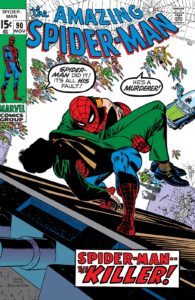 2) The Amazing Spider-Man #88-90 (by Stan Lee and Gil Kane & John Romita)
2) The Amazing Spider-Man #88-90 (by Stan Lee and Gil Kane & John Romita)
Spidey fails, losing a role model for the second time in his young life and learning another harsh lesson about the importance of responsibility. What starts as a solid Doctor Octopus story becomes a classic when Capt. George Stacy gets caught in the crossfire—while performing his own heroic act, no less. The last two pages display more sincere emotion than most entire storylines from this era, and it succeeds because Stan Lee & Co. had put in the hard work over the previous few years’ worth of Spider-Man stories, building strong relationships between Peter Parker, Gwen Stacy, and Capt. Stacy.
1) Fantastic Four #51 (by Stan Lee and Jack Kirby)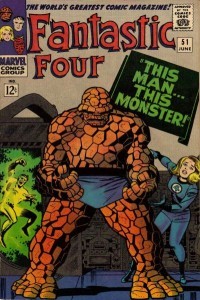
The Galactus Trilogy may be the more famous story, but I say this is the better one—indeed, the best of this five-year increment. More than any other issue in the Lee-Kirby era, it expertly grounds big sci-fi spectacle in a very human story—specifically, an envious nobody learning about heroism by spending a day in the Thing’s skin (or rocks, I guess) during Mr. Fantastic’s first voyage to the Negative Zone. It’s everything the Fantastic Four of any era should aspire to be, and it achieves it without any of the usual fisticuffs.
February 10, 2018
Exclusive Report: I’m no longer exclusive
My books were enrolled in Kindle Select for a while, and that was fine. I gave away a bunch of free ebooks like I was Santa Claus and offered some sales like I was Wal-Mart. And I agreed not to sell my ebooks through any other outlet, like I was rationing them or something.
Anyway, that’s all done now. I’ve republished through Smashwords, and they were nice enough to distribute to several fine retailers, such as Barnes & Noble and Kobo. So if you don’t like the Amazon/Kindle option, there is another. More than just one other, in fact. Check out my “Books” tab above for thrilling links to some of those prodigious purveyors of electronic publishing.
Meanwhile, I’m continuing revisions on Terrific and getting that in shape for release later this year, at long last. I posted a draft of the first chapter a while ago; perhaps I’ll post a draft of chapter two soon.
Also, the second installment of my “Marvel’s Top Ten” blog series should also be ready before too much longer, so keep an eye out for the best of 1965-1970 in the coming weeks.
And don’t forget: If you’ve read and enjoyed any of my books, please be so kind as to leave a review at the retailer of your choice. Even a super-short, quick one can make all the difference. Thank you!
October 22, 2017
Marvel’s Top Ten Stories: 1961-1965
Presenting, just for fun, Marvel Comics’ ten best stories from 1961-1965!
Why only a five-year period? For proper apples-to-apples comparisons, firstly. The comics medium has changed quite a bit over the years, so it’s hardly fair to compare, say, ten-year-old comics to fifty-year-old comics. Plus, the shorter period is more manageable and allows me to highlight more great books over time—sometimes complete storylines, sometimes standout single issues, whatever is merited. (I’ll get to later periods…eventually. And note that these are grouped by release date, not cover date.)
So we begin at the dawn of the Marvel Universe. True, many books from this era don’t hold up particularly well, not to the adult reader. They are dated indeed. But in the foundation of each series are strong, enduring concepts and flawed but heroic characters that people of varied backgrounds can relate to. Plus, the old comics offer plenty of charm with their fast-paced displays of free-flowing imagination. Looking back on these early issues, it’s not hard to see why the characters have survived the decades.
(Spoilers ahead, but these came out over five decades ago, so…)
Let’s get to it. As Stan Lee would say, Face Front, True Believers! Make Mine Marvel! Excelsior! ’Nuff Said!
Wait. Not ’Nuff Said yet. We need the list…
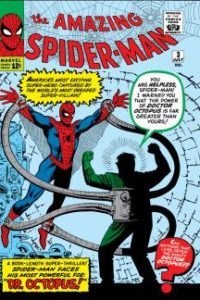 10) The Amazing Spider-Man #3 (by Stan Lee and Steve Ditko)
10) The Amazing Spider-Man #3 (by Stan Lee and Steve Ditko)
The superhero genre has a simple but effective formula: The hero almost loses to the villain but ultimately prevails, often improving him or herself along the way. Doctor Octopus’s debut shows an early example of that formula in action, back when flawed superheroes were still a fresh idea. As the book opens, Spider-Man is feeling supremely confident in his crimefighting abilities, and he’s itching for a challenge.
And he gets one, and he gets clobbered, leading Peter to wonder if he’s even cut out for this superhero lifestyle after all. So he’s got a choice: quit, or try again but do it better this time.
Peter Parker is still growing into his role at this stage, and that’s part of what made this series so novel—the superhero was actually growing as a person.
And we haven’t seen the last of Spider-Man on this list. The Amazing Spider-Man was easily Marvel’s strongest series of this era.
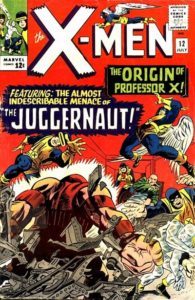 9) X-Men #12 (By Stan Lee, Jack Kirby, and Alex Toth)
9) X-Men #12 (By Stan Lee, Jack Kirby, and Alex Toth)
The X-Men, however, was not Marvel’s greatest hit back then. Their best days were ahead of them, but they had a couple of gems among their early issues. One was the debut of Professor Xavier’s evil stepbrother, the Juggernaut.
Juggernaut is like a precursor of Jaws here. The X-Men know he’s on his way to their mansion, and Prof. X warns them of his stepbrother’s tremendous power. Much of the issue is divided between the X-Men preparing for his arrival, and Prof. X sharing his family history. Meanwhile, a shadowy figure easily plows through the mansion’s defenses.
It’s an issue of build-up, establishing a serious physical threat and setting the stage for an action-packed showdown. The next issue isn’t quite as strong, but the tension in part one is excellent.
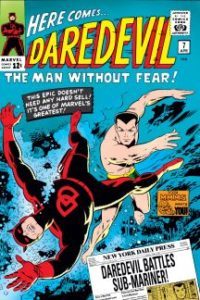 8) Daredevil #7 (by Stan Lee and Wally Wood)
8) Daredevil #7 (by Stan Lee and Wally Wood)
One of the great Marvel concepts Stan Lee pioneered was casting the superhero as the underdog, thereby raising the stakes and making the character all the more heroic.
Now, the plot of Daredevil #7 is a wee bit ridiculous. Namor the Sub-Mariner wants to sue the human race so Atlantis can claim dominion over the surface world, and the first law firm he finds is, naturally, Nelson & Murdock.
But when things don’t go Namor’s way, he goes on a rampage, and here’s where the book becomes an early classic. Daredevil realizes that an all-out battle between Namor and the U.S. Army would result in countless casualties, so he takes it upon himself to prevent that from happening. However, “taking it upon himself” means volunteering to fight a super-strong, flying monarch one-on-one. And recall—Daredevil is an athletic blind man with enhanced senses and no other powers.
Daredevil loses the battle but achieves his objective of saving lives, and he thereby earns Namor’s sincere respect—and the reader’s.
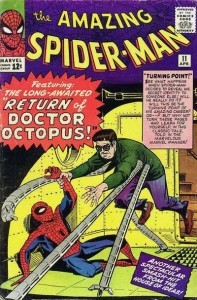 7) The Amazing Spider-Man #11-12 (by Stan Lee and Steve Ditko)
7) The Amazing Spider-Man #11-12 (by Stan Lee and Steve Ditko)
Spidey’s back on the list, and so is Doc Ock, this time in a two-parter that shows the Lee/Ditko team really finding their groove. Peter Parker’s troubles intersect with Spider-Man’s when he finds his girlfriend Betty Brant picking up Doctor Octopus from jail.
Secret-identity issues are at the core of this action/soap-opera blend. Peter resolves to tell Betty he’s Spider-Man, but tragedy interferes! He fights Doc Octopus while sick, so Doc Ock easily overpowers him…and unmasks him! No one believes Peter is Spider-Man, of course, but classmate Liz Allan becomes smitten with Peter after hearing about his bravery in confronting the villain.
These two issues put Peter through several ups and downs, keeping him fallible and human throughout.
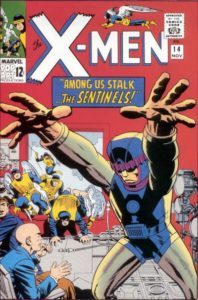 6) X-Men #14 (by Stan Lee, Jack Kirby, and Jay Gavin)
6) X-Men #14 (by Stan Lee, Jack Kirby, and Jay Gavin)
No single issue of the early X-Men came closer to achieving the potential of its concept than this one, in which anti-mutant hysteria leads to the creation of the mutant-hunting Sentinel robots. Of course, if you build robots designed to kill people, don’t expect things to turn out well for anyone.
As with the previous X-Men entry on this list, part one is the strongest, but this part one demonstrates everything the book was supposed to be. It’s a story of how humanity’s paranoia and prejudices can be its undoing, told from the point of view of gifted teenagers who are just trying to live their lives.
The Sentinels would return many times, but their most primitive version here may well be their creepiest iteration.
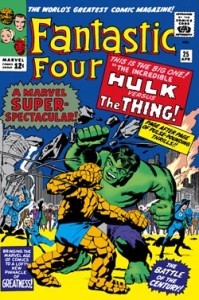 5) Fantastic Four #25 (by Stan Lee and Jack Kirby)
5) Fantastic Four #25 (by Stan Lee and Jack Kirby)
It’s all-out action for most of the book, an epic slugfest between two of Marvel’s strongest. The Thing is normally the toughest guy around, but against the Hulk, he’s out of his weight class. Unfortunately, when the Hulk rampages through New York City, the Thing is the only one even remotely strong enough to hold his own against him, so he gives it all he’s got and then some.
And it’s not enough. After a long, well-choreographed fight, the Hulk wins. For perhaps the first time, the Thing is on the receiving end of the clobbering. But he picks himself back up and gets ready for the next round. The final three panels, showing him climbing back to his feet, are loaded with character.
Like the previously mentioned Daredevil issue, the superhero is the underdog, and the real victory is in refusing to quit when people are depending on you.
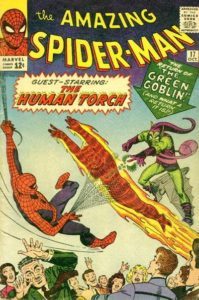 4) The Amazing Spider-Man #17 (by Stan Lee and Steve Ditko)
4) The Amazing Spider-Man #17 (by Stan Lee and Steve Ditko)
An issue of chaotic, farcical fun, when Peter Parker and Spider-Man are supposed to be at the same place at the same time. Ironically, that place happens to be a meeting of Spidey’s fan club, the president of which is Peter’s high school bully, Flash Thompson. Betty Brant and Liz Allan vie for Peter’s affections while the Green Goblin strikes and the Human Torch joins the action.
As fun as it all is, though, the issue doesn’t end on a high note for its lead. Peter’s concern for his Aunt May causes him to leave the middle of a fight, which of course will be misinterpreted by nearly everyone.
Spidey can hardly catch a break, even at a meeting of his own fan club, but he keeps trying to do the right thing. Exactly as it should be.
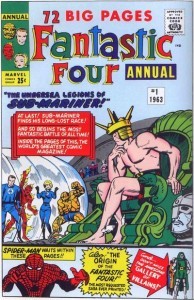 3) Fantastic Four Annual #1 (by Stan Lee and Jack Kirby)
3) Fantastic Four Annual #1 (by Stan Lee and Jack Kirby)
Namor was one of Marvel’s best antagonists during this era, primarily because he’s never been purely evil (he was Marvel’s first superhero back in the Golden Age, after all). He acts on behalf of his kingdom, which he’s only recently rediscovered before this issue. Any monarch would do the same, but in this case, that entails him imperiling the surface world, requiring the Fantastic Four to stop him and prevent a war that mankind would likely lose.
But the Fantastic Four aren’t the ones who stop him. Rather, Namor brings about his own downfall, risking everything to save the Invisible Girl (whom he has a well-established crush on). In doing so, he loses everything.
The Marvel Universe’s first annual is appropriately grand and epic in scope, but it ultimately succeeds because of the work Lee and Kirby put into the villain.
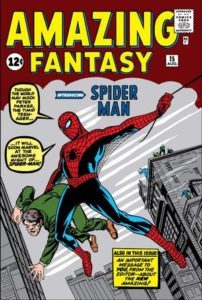 2) Amazing Fantasy #15 (by Stan Lee and Steve Ditko)
2) Amazing Fantasy #15 (by Stan Lee and Steve Ditko)
Marvel’s greatest origin story took a mere handful of pages to tell. And while surface elements are dated, its themes are timeless.
What’s especially fascinating is how Lee writes pre-heroic Peter Parker. The way he acts in these pages, Peter could just as easily slide into villainy instead of heroism. He sounds hardly different than some of the foes he’ll later fight throughout his career as Spider-Man.
“Some day I’ll show them! *sob* Some day they’ll be sorry—sorry that they laughed at me!” Peter says of his high school tormentors.
Later, of his aunt and uncle, he thinks, “They’re the only ones who’ve ever been kind to me! I’ll see to it that they’re always happy, but the rest of the world can go hang for all I care!”
But when Uncle Ben dies at the hands of a mugger Peter allowed to escape, the lessons of their kindness finally sink in. The brilliant Peter Parker was tragically slow to learn, but now he’ll never forget.
The radioactive spider-bite isn’t what makes him Spider-Man. Aunt May and Uncle Ben, in being genuinely good people, show him how to be Spider-Man.
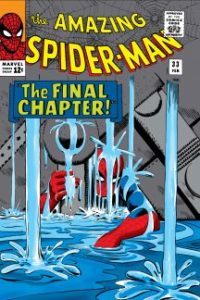 1) The Amazing Spider-Man #31-33 (by Stan Lee and Steve Ditko)
1) The Amazing Spider-Man #31-33 (by Stan Lee and Steve Ditko)
In television terms, these three issues feel like Spider-Man’s season one finale. On one hand, it moves Peter’s life forward, bringing him to college where we meet new supporting characters such as Gwen Stacy and Harry Osborn. But it also allows Peter to earn a measure of redemption, a chance to save his aunt where he had failed his uncle.
Doctor Octopus is back and up to something (clearly, he’s the MVP Spidey villain of this era), but Peter is primarily concerned with obtaining a life-saving treatment for his ailing aunt. While Aunt May has many, many health problems throughout the series, this particular ailment results from a previous blood transfusion with Peter. (Irradiated blood can cause health problems? What?) So while it’s not technically Peter’s fault, he can plausibly blame himself for the predicament.
Spider-Man and Dr. Connors (formerly the Lizard) work together to create a treatment, but Doc Ock’s goons steal it. Now Spidey needs to go above and beyond to reclaim it, fighting off his greatest enemy and an army of henchmen to save his aunt (and, incidentally, save the world from Doc Ock’s schemes).
This leads to one of the most iconic Spider-Man scenes ever drawn, and I don’t use “iconic” lightly. An exhausted Spidey is trapped under a tremendous weight, with the life-saving treatment just out of reach. To get free, he must be stronger than ever. And here’s where the series comes full-circle.
“If she—doesn’t make it—it’ll be my fault! Just the way I’ll always blame myself for what happened to Uncle Ben!” Spider-Man thinks while pinned down. “The two people in all the world who’ve been kindest to me! I can’t fail again! It can’t happen a second time! I won’t let it—I won’t!”
The moment he succeeds in raising that weight is more triumphant than any victory against a supervillain—and he’s not even out of the woods yet! Lee and Ditko prove that comics can, and should, be about more than guys in tights punching each other out.
Okay, now… ’nuff said!
May 17, 2017
Terrific — Chapter One
Yes, yes, yes. I’m still working on my upcoming superhero novel, Terrific. What, you don’t believe me? Well, here’s the proof!
Below is the current draft of the first chapter. Note that it is just a draft and will undergo revisions later, but things are coming along. When you self-publish, it’s vitally important that you reject your own work to ensure you put out the best possible book. I’ve rejected two full previous versions of Terrific, as well as another half a manuscript, but I’m feeling confident about how this one is turning out.
So read it, enjoy, and bug me to get the thing finished and published.
*****************************
Copyright 2017 Daniel R. Sherrier. All Rights Reserved. Do not reproduce without permission.
Terrific
–a novel–
By Daniel Sherrier
1.
Miranda Thomas liked pretending to be someone else. Her true self receded behind a persona she had spent innumerable hours crafting, rehearsing, and perfecting to the greatest possible extent. And her hard work paid off as she made her regional theatre debut in The Reluctant Guest.
They enjoyed her. Several dozen strangers laughed at all the right moments. Everyone returned to their seats after intermission. They cheered when the lights went down at the play’s conclusion. And audiences never lied. Miranda loved that about them.
She had graduated from Olympus University a mere three months earlier, and she was already doing her favorite thing in the world…as a professional. Her castmates were fun, the reviews were strong, and the nonprofit company owned a charming venue. This was not a poor start.
Today’s matinee wasn’t quite finished. Miranda had one last moment on the stage, the only one as herself.
Warm light enveloping her, she crossed the polished floorboards of the Aeschylus Theater for her curtain call. The stage was smaller than most, and its house seated a mere eighty-eight on three sides. An intimate performance space, perfect for a four-person contemporary comedy. It minimized the barrier between actors and audience, filtering none of their reaction. Right now, it was Miranda’s stage.
Difficult to see the audience’s faces through the glare of the lights, but everyone saw her—a petite young woman with tremendous presence. Her eyes, large and vibrant, attracted all others. The applause sounded not polite, but genuine. She knew the difference. Enthusiasm fortified each clap, and it all coalesced into an intoxicating fanfare. Some of those silhouettes rose from their seats. They didn’t have to. Miranda earned that.
One tiny concern at the back of her mind, however. She wasn’t positive they were truly seeing Miranda Thomas, the actress, rather than the humorously absent-minded host she had played for the previous two hours. They needed to recognize her, and recognize that they wanted to keep seeing her in various roles in so many other plays, television shows, and movies. This production couldn’t be her pinnacle. If this was the pinnacle, then she failed, and odds were, she was going to fail in the only thing she ever wanted to do. But she couldn’t think about that now, certainly not while people were applauding her. Besides, she’d no doubt receive plenty of reminders about her long odds during dinner immediately afterward.
Miranda bowed, and a burst of cheers cleaved through the overall applause—cheers all coming from the same narrow source. She didn’t earn those. Her family gave them freely. Rest assured, they saw only Miranda—now and throughout the entire production. All that work, effort, and craftsmanship, and they perceived none of it. Until the curtain call, to avoid any distraction, she had pretended they weren’t even there.
Not that she didn’t appreciate their attendance, of course. A cross-country trip from the East Coast to Olympus City wasn’t a simple jaunt, and the timing just about worked out. Parents Naomi and Vern had just wrapped up a major project for the small architectural firm they founded, owned, and operated. Older sister Bianca was starting her next semester of medical school in a few days, and little sister Peyton had a week before she embarked on her first day of high school. They all found the time to support Miranda’s first post-college production…and evaluate the overall status of her life.
They hadn’t done the latter yet. As soon as she finished changing, Miranda met them in the lobby, received copious hugs and congratulations, and led them across the busy street to Ambrosia, the touristy yet tasty restaurant they had made reservations at.
As they filed into a curved booth situated beneath a mural of Ancient Greek paintings, her family continued raving about the play, and Miranda considered it in her best interests to keep them focused on this topic.
“I was surprised at how talented the whole cast was,” Naomi said while scanning the menu, which was written in a fancy calligraphy surrounded by ample white space to emphasize the fanciness. “We of course knew you’d be wonderful, but everyone was so funny.”
It was a professional production. Why was that a surprise? But Miranda decided to ignore the backhanded compliment. Just let her keep talking. And Naomi did.
“I can’t remember the last time I laughed so hard.”
Miranda almost chuckled. “That would be a great review quote. You should write that up, and we’ll plaster it across all the posters.” She swept an arm across an imaginary billboard.
Naomi squinted at an item on the menu, then looked over her glasses as her daughter’s words finally registered. In part, at least. “Is there some website where audiences can leave feedback? I’d do it if you think it would help.”
“No, Mom. I’m kidding. But thank you.”
Miranda smirked and expected Bianca to also be smirking at their mother’s naivety, and they would share a silent laugh across the table as they had done countless times in their youth. But Bianca’s phone distracted her. Probably a text from her boyfriend. Whatever was on her phone elicited a fond smile.
Flashing a grin, Bianca patted Naomi’s shoulder as she put her phone away. “Don’t worry, Mom. We always pick with love.”
The eldest Thomas girl looked like a barely older Miranda stretched out to accommodate an extra six inches of height—a bigger Miranda, like a funhouse mirror.
A young waiter arrived to take their orders. Miranda could’ve sworn she had met him somewhere. Another actor? She might have seen him at the auditions for The Reluctant Guest. Poor guy.
Miranda didn’t want to even contemplate what she might be doing that very moment if she hadn’t gotten cast. She could have been serving the next table over, channeling the full force of her talents into convincing customers she wanted to be there and delighted in tending to their every Ambrosia-related need. Five days a week, maybe more, she would be coming to this same place, walking past those same replicas of Ancient Greek artifacts and artwork, internally mocking the establishment for trying to be a weird restaurant/museum hybrid, at least when she wasn’t struggling to tune out the obligatory screaming child. A tantrum was already in progress across the room, easily making itself heard despite the considerable competition from the neighboring table of loud-talkers. The sole bright spot would be that the European cuisines smelled delicious, but they would no doubt transition from tantalizing to revolting after piling into her nose day after day.
Miranda wrapped her arms tight around herself in response to a perceived temperature drop. Vern asked if she was cold and offered his sports coat. Fitted to accommodate his protruding belly, it could easily blanket Miranda several times over. She declined. She already felt small enough after noticing little Peyton had surpassed her in height since their last visit.
All meals decided upon, her family resumed complimenting various aspects of the production, as if that would lend validity to their obviously biased praise of Miranda’s performance. But she was happy to discuss the show for as long as they wanted. It was a safe topic that, once exhausted, would give way to a barrage of highly invasive questions. Those questions currently waited within a time bomb, one hidden so Miranda couldn’t see its timer. She could, however, keep twisting the dial back to delay the inevitable explosion.
“Oh, hey, fun fact—the guy who wrote this play also writes for that TV show you all love, the one about the doctors.”
That led to a nice tangent that filled the remainder of their wait for the food. But Bianca grew quiet. She observed Miranda, something bugging her. Peyton was even less chatty, had been all night, kept twirling her long hair around her fingers.
The waiter eventually returned with everyone’s meals, which for Peyton necessitated an inspection to gauge the edibility of its contents. She poked the pasta with her fork to make sure no unwanted elements lurked underneath. She moved lethargically, her eyes squinted. This distracted Miranda from her detailed explanation of the costume design process. What was up with the Little One?
Bianca, between bites, exploited the brief lull. “Has Brad seen the show yet? What did he think?”
Boom.
Brad was Miranda’s boyfriend until a few weeks ago. She hadn’t gotten around to informing her family about the break-up. In hindsight, it probably would have been better news to share during a phone conversation, which she could have ended with the slightest vague excuse. She considered telling a little white lie to avoid prolonged discourse on the topic, but they were so nice to come all this way. And besides, Bianca’s tone suggested she had an educated guess about her sister’s relationship status. Bianca and her own boyfriend had been dating since their freshman year of college and would be getting engaged any second now, and somehow that elevated her to the status of expert on Miranda’s relationships.
“I don’t know,” Miranda said.
“Has that boy not seen it?” Her father bristled at the very idea. “At a minimum, he should have been there opening night.”
Time to get it over with. “Don’t make a big deal about this, but we broke up. It’s fine, though!”
“Are you okay?” Naomi asked.
“It’s fine.” Miranda’s hands shot up into a defensive posture, which she didn’t realize until after the fact.
Vern wiped a speck of salad dressing off his goatee to ensure he asked his question with the requisite dignity and gravity. His eyes narrowed. “Are you okay?”
Because if Naomi’s emphasis on the word “okay” failed to uncover any problems, then surely the emphasis on “are” would succeed. Maybe next Bianca could emphasize the “you,” just for kicks.
“I am still fine.” Miranda put on a ridiculously huge smile and pointed to it. “See?”
Naomi persisted: “I’d still like to know what happened. You two seemed to be getting along just fine at the graduation ceremony.”
“We were, and we’re still on friendly terms. There’s nothing to worry about.”
“I know what happened,” Bianca said, tapping the table and drawing attention back to her. “You did what you always do. You latched onto a guy you figured would be fun for the short term, but who you knew wasn’t a keeper. The guy came with an expiration date, and you reached it.”
Miranda planned on taking a breath, focusing on her succulent lamb, and simply allowing everyone to keep talking until they purged the topic from their systems. Instead, she found herself speaking extra quickly.
“I do not do that. Sometimes things just don’t work out. You’re luckier than most.”
“It’s not luck.”
“Okay, so you’re better than most.”
“That’s not what I meant.”
“Do I look unhappy?” Miranda’s speech continued its acceleration, and her hands tried to assist, gesturing this way and that without a discernible game plan. “Do I look like I’m pining away for some great lost love? No, I’m fine. I’m focused on the show, and focused on making sure another show follows.”
She miscalculated. She opened the door for a new, potentially worse line of questioning—her most-likely-to-fail career.
His meal wasn’t half finished, but Vern set his utensils down and folded his hands as he leaned forward. “What are your plans if there’s not another show immediately after this?”
Naomi served the follow-up: “Is this show paying you enough to meet all your expenses? Rent is not cheap in this city. You could get the same square footage for three quarters of the price back home. Maybe less. And oh, you could room with Alyssa. How fun would that be?”
Having not heard from her supposed best-friend-forever in nearly a month, Miranda wasn’t entirely sure. Yet another topic she preferred not to explore in this group discussion.
Miranda wondered if she could stage a last-minute segue to steer everyone back toward discussing the show, but a ship this size could not easily turn.
Naomi went on about the city’s high tax rates. Vern offered multiple suggestions for part-time employment to “stop the bleeding,” as he put it. Naomi suggested that if Miranda married a well-to-do young man, he could support her and allow her to act without any urgency for a paycheck and “just for the fun of it,” and certainly Brad didn’t seem poised for a lucrative career, so perhaps there was a silver lining to Miranda’s heartbreak. Miranda reiterated that she was fine.
The conversation continued, but with Miranda firmly in the role of spectator. Bianca accused Naomi of suggesting her daughter become a “kept woman,” which Naomi refuted. Peyton studied a portrait of Athena—the kid was utterly transfixed, her expression blank.
Miranda zoned out briefly and missed the transition into worries about her physical safety in the big city…the big city she had already survived for four years of college.
“I should look up the crime statistics when we get back to the hotel,” Vern said. “Not every part of this city will be as safe as that campus was.”
This, at least, was an easy one.
Miranda stated the obvious. “Dad. This city has never been safer. Never.”
*****
The high sun surprised Miranda as they exited the restaurant. She could’ve sworn it was later, though she wasn’t sure whether to blame the matinee or the dinner conversation for that confusion. But she knew what she needed to do.
She linked an arm around Peyton’s, and they quickened their pace down the sidewalk.
“I’m showing her the huge bookstore right down the block,” Miranda shouted back. “You’ll see it.”
Lest the kids forget, their parents issued the usual reminders to have fun and be careful. Of course Peyton would have fun in a bookstore. She was always reading around the house, always in the middle of a few novels of assorted genres, always on the hunt for the next great one.
Peyton whispered, “Where are we really going?”
“To a huge bookstore. I’m not getting into any more trouble here.”
Miranda truly had expected the bookstore to excite her, but Peyton’s fog didn’t lift. So Miranda employed a second tact—having fun with her growth spurt. Peyton had always seemed more on track to achieve Bianca’s height rather than succumb to the same short genes that left Miranda barely scraping past the five-foot mark. While not shocking, Miranda was never going to be prepared for it.
“So I see you’ve grown. That really wasn’t necessary. High schools don’t actually have any of those ‘You must be this tall to enter’ signs. You’re thinking roller coasters.”
Peyton laughed. She still sounded young and girly, and she remained awkwardly scrawny, unsure how to carry those narrow shoulders. All as it should be. Only so much growing up permitted.
The giggling petered out sooner than usual, though, and Peyton withdrew into her own head.
“This is a used bookstore, so everything’s super-cheap,” Miranda said. “And I know this is a short trip, but you’re still so many miles from home, so it counts as a vacation and Mom and Dad will get you a special vacation prize. Don’t forget to claim it.”
All she got in response was a muttered “Yeah, okay.”
Miranda guided her through a gap in the oncoming pedestrian traffic and into Olympus’s premier seller of secondhand literature. Stacks upon stacks of potentially amazing discoveries awaited Peyton…and she still couldn’t care less.
Something was bothering her, and it wasn’t hard to guess what. “You’ll do great in high school. Now middle school—that was the hard part. If you can get through that, consider yourself unstoppable.”
“It’s just…” Peyton’s mouth hung open long enough for the words to perish. “It’s nothing.”
Clearly not. The sidewalk had a few benches, so Miranda escorted Peyton back outside.
“I want to hear all about this ‘nothing,’” Miranda said.
Peyton sat and then nodded. “So in high school, I’ll basically be preparing for college, right?”
“There is a lot of college prep, yes.”
“Then college is all about preparing for a career.”
“It does help with that.”
“And when you’re working, you’re preparing for retirement and your kids’ educations.”
Oh, yes—Miranda was supposed to be saving her oodles of excess income for retirement. She had intentionally forgotten, largely because those oodles were, in fact, imaginary.
“What’s wrong?”
Hardly even blinking, Peyton gazed straight ahead at the vehicles crawling down the street, futilely honking their horns. She scrunched her face, carefully considering her response as she spoke it.
“This summer is the end of my childhood, and then everything is about preparing for something else. What if I’m so busy always preparing that it all stops being fun?”
Either of their parents would have handled this much better, Miranda realized. They, or even Bianca, would have dispensed suitable wisdom to alleviate Peyton’s anxieties about growing up. All Miranda managed to do was mutter the basic no, no, that would never happen, you’ll be fine, you’ll have a blast…did she actually say “you’ll have a blast”?
It sounded pathetic and unconvincing, and guilt over her poor showing blocked her brain from producing anything better. But any advice would have involved mere guesswork, if not outright lies. What did Miranda know? She didn’t know what she’d be doing in four weeks when her play closed. Even her friendship with Alyssa—which was supposed to be her one enduring relationship from high school—no longer seemed a given.
She kept trying. She couldn’t look at Peyton’s melancholy face and not keep trying. So she started talking about how much fun she had in high school, then slowed down upon realizing she didn’t want Peyton to partake in all the same types of fun. All the worst examples kept pushing to the front of Miranda’s mind—that day she played hooky, her first party with alcohol, losing her virginity in the auditorium’s well-concealed catwalk. Where were the PG examples? They existed, they happened, but the memories chose that moment to go into hibernation.
“Everything will be fine,” Miranda said, knowing damn well how often she used “fine” to mean nothing of the sort. It reeked of insincerity—a sin for an actor.
Peyton rested her head on Miranda’s shoulder, so Miranda put an arm around her. They watched the traffic, occasionally glimpsing the pedestrians on the far side.
But Miranda wasn’t content. She felt she was failing her little sister with every second she proved unable to offer the perfect advice, the perfect wisdom, the perfect reassurance, anything perfect. Peyton deserved no less than perfect.
Her concentration collapsed altogether when a large, haggard man snatched a lady’s purse across the street and dashed away, shoving people aside with his meaty arms.
He made it half a block before the equivalent of a giant camera flash blinded him, and the light congealed into a man.
Miranda tugged at Peyton, urging her to her feet. “Peyton! You’ll want to see this.”
Pedestrians on both sides of the street did, too, and the motorists ceased their honking, suddenly in no hurry. Many cell phones vacated pockets and purses. Everyone, whatever their background or current plans, stopped and watched the confrontation between the stupidly brazen purse-snatcher and the world’s first and only superhero—Fantastic Man.
As of a month ago, an actual superhero existed. Not some martial arts enthusiast with a costume and death wish, but rather a uniquely talented man who could manipulate light by thinking about it…a man who was able to convert his entire body into a bunch of photons, transforming himself into living light, and return to human form unscathed. No one knew who he was or how he came to be, but everyone knew he protected Olympus City.
Miranda and Peyton angled for the best view of that radiant blue-and-amber uniform, whose radiance wasn’t figurative. They couldn’t hear a thing over all the commotion, but for a moment they had an unobstructed line of sight to the most sparkling smile ever seen outside a toothpaste commercial, beneath a mask shaped like a hazy setting sun. Even with some distance, Miranda could read him—his posture impeccable, his yellow cape fluttering behind him, he projected the image of man who would never allow anything to go wrong, not on his watch.
And that purse-snatcher knew it. Rubbing his stunned eyeballs, he hustled away, not even attempting a fight.
Fantastic Man dematerialized into light and reappeared once again in front of the purse-snatcher. The superhero was tall and muscular in his own right, but still smaller than this hulking thief, a fact neither seemed aware of. Fantastic Man thrust an arm forward and unleashed another flash to disorient his opponent, and he followed by sweeping his leg through the purse-snatcher’s, toppling him onto the pavement.
Two police officers cut through the crowd and handcuffed the criminal. Fantastic Man stuck around to shake their hands, his smile unrelenting. He returned the purse to its owner, who responded as if she had won the lottery, and the Beacon of Brightness waved at the cheering throngs surrounding him, then looked to sky and disappeared in a brilliant flare.
Peyton was entranced. Her mouth hung open, and the grin looked permanent.
“That was the coolest thing ever,” she said.
Her previous worries were now the last thing on her mind. Where Miranda had failed, Fantastic Man saved the day.
*****************************
And there you have it. Chapter One, or the current version of it, anyway. Let me know what you think, please.
By the way, I don’t do Kickstarter, but I do have other books for your consideration.
May 16, 2017
Today’s Super Comic — Action Comics #775 (2001)
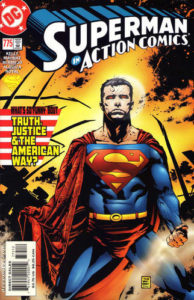 At last, here we are. May 17, 2016, I started writing one quick, positive comic book review a day, with the goal of doing so for a full year. It was part writing exercise (get the words down fast and move on), part analytical exercise (if a book works, why does it work?), and an opportunity to focus on the positive and thank the writers and artists who have given me countless hours of enjoyment over the course of many years.
At last, here we are. May 17, 2016, I started writing one quick, positive comic book review a day, with the goal of doing so for a full year. It was part writing exercise (get the words down fast and move on), part analytical exercise (if a book works, why does it work?), and an opportunity to focus on the positive and thank the writers and artists who have given me countless hours of enjoyment over the course of many years.
So let’s finish with one of the best single-issue Superman stories ever written. Action Comics #775 shows us why Superman will never go out of style and should never go out of style.
A new team of powerful superhumans appears. They call themselves the Elite, and to get the job done, they’ll kill the bad guys and any innocent bystanders who happen to be within range, so long as the larger threat is eliminated, permanently.
Superman’s not having that. As the public begins to wonder if maybe there’s some validity to the Elite’s approach, Superman realizes it’s up to him to show the world there’s a better way.
What makes Superman cool isn’t his powers; it’s how he uses them. He doesn’t force his will on others or try to seize more power for himself, and he leads by example, with physical force being the last resort. He always operates within clearly set parameters. It would be too easy for him to cross any number of lines, so he doesn’t. Most others would give into the temptation, but he’s strong enough to control himself.
In this issue, he’s not only trying to stop the Elite from killing people, but he’s also standing up for ideals—and he’s standing up to people who are seemingly more powerful than even he is.
“Dreams save us. Dreams lift us up and transform us. And on my soul, I swear… until my dream of a world where dignity, honor and justice becomes the reality we all share — I’ll never stop fighting. Ever.”
Ladies and gentlemen—Superman! There’s a reason he’s the greatest superhero ever created. He’s a role model for kids and adults alike, and he demonstrates values that should never go out of style, no matter how times change.
Writer: Joe Kelly
Penciler: Doug Mahnke and Lee Bermejo
Cover: Tim Bradstreet
Publisher: DC Comics
How to Read It: back issues; Comixology
Appropriate For: ages 12 and up





